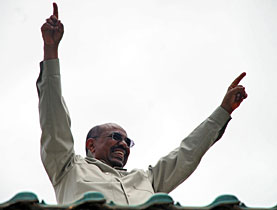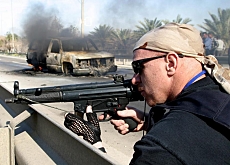Rules of war clarified for private contractors

The fog surrounding the activities of private security companies in war zones should be cleared by a set of guidelines agreed in Switzerland on Wednesday.
Experts from 17 countries approved the recommendations at the end of a three-day meeting in the resort of Montreux, organised by the Swiss foreign ministry and the Geneva-based International Committee of the Red Cross (ICRC).
The document brings together and clarifies the current laws and obligations affecting private military and security companies, known collectively as PMSCs.
Paul Seger, head of international law at the Swiss foreign ministry, told swissinfo that he was very pleased with the document, which had found a consensus by taking a pragmatic approach.
“The fact that we have now for the first time a document spelling out exactly what the rules of humanitarian law and human rights law are, being accepted by both sides – those who mandate PMSCs and those who receive them – gives this document credibility and legitimacy,” he said.
Although the document itself is not legally binding, the laws that it lists are universally applicable.
“The document clearly reaffirms the fact that military and security contractors dispatched to war zones must comply with international law, and that states have a particular responsibility for ensuring compliance,” said the ICRC website, quoting its director for international law, Philip Spoerri.
A foreign ministry statement pointed out that under international law “states cannot circumvent their obligations by using PMSCs”.
Good practices
The document not only clarifies the relevant laws, but also defines a number of “good practices”.
It recommends that PMSCs should be regulated and licensed, and says the staff should be vetted and trained in humanitarian law. They should have standard operating procedures which comply with the law, and personnel who violate the law should be disciplined.
“The practical impact will be, I hope, quite a big one,” Seger said.
The meeting in Montreux was the fourth and final one since the foreign ministry and the ICRC launched an initiative in 2005 aimed at ensuring respect for international humanitarian law and human rights law.
It was attended by experts from the foreign ministries, and often also of the defence ministries, of the participating countries. Countries which employ PMSCs and countries where they operate were involved in the discussions. They included the United States, Britain, Iraq, Afghanistan, Angola and Sierra Leone.
Controversial
The issue of PMSCs is relatively new. Until the 1980s states were largely responsible for their own armed forces, but since then they have increasingly turned to the private sector.
These companies describe their services in such terms as “protective security”, “security consultancy” and “risk management”. They are often staffed by former special forces staff.
Many of the private contractors currently used by the US in Iraq are simply providing logistical support, including supplying food to army bases and maintaining equipment.
But a report by Congress issued last month found that about 12 per cent of the money being spent by the US on private contractors in Iraq was to pay for security, such as that provided by Blackwater Worldwide, which guards US government personnel.
Blackwater came under the spotlight last year when its guards killed 17 civilians in a single incident in Baghdad.
“Positive role”
This specific case may have hit the headlines, but Seger was clear that the US took its responsibilities seriously.
“I have to say that the US played a very positive role. Of course there were at times very tough discussions about what is exactly the content of such and such a rule, but this is absolutely normal,” he told swissinfo.
“The issue of immunity, or impunity, is clearly spelled out in this document, meaning that PMSCs who have committed misconduct must be tried either in the country concerned or by the contracting state.”
The Swiss government and the ICRC will now distribute the Montreux document as widely as possible, suggesting that all states, organisations and the PMSCs themselves take it as a reference text and implement the measures it suggests.
swissinfo, Julia Slater
The Montreux document arises from an initiative first elaborated by the Swiss foreign ministry and the Red Cross in 2005.
It was subsequently refined in four meetings in 2006 and 2008 attended by representatives of 18 countries.
In addition to experts from foreign and defence ministries of the participating countries, the meetings were also involved non-governmental organisations and the private security industry.
The final draft was endorsed by a high level meeting of legal advisers of the participating governments.
The 17 signatories are:
Afghanistan
Angola
Australia
Austria
Britain
Canada
China
France
Germany
Iraq
Poland
Sierra Leone
South Africa
Sweden
Switzerland
Ukraine
United States
Russia attended previous meetings.

In compliance with the JTI standards
More: SWI swissinfo.ch certified by the Journalism Trust Initiative











You can find an overview of ongoing debates with our journalists here . Please join us!
If you want to start a conversation about a topic raised in this article or want to report factual errors, email us at english@swissinfo.ch.